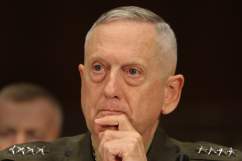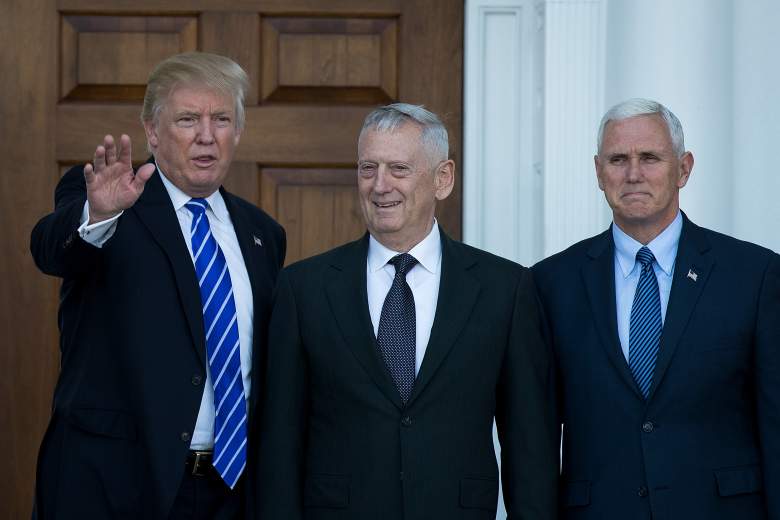
Gen. James Mattis (center) with Donald Trump and Mike Pence on November 19. (Getty)
Retired U.S. Marine Corps General James “Mad Dog” Mattis is President Donald Trump‘s Secretary of Defense. Mattis, who has only been retired for three years, was also floated as a possible Vice Presidential pick before Trump chose Indiana Governor Mike Pence instead.
After a life in the military, Mattis has been critical of President Barack Obama‘s Iran Nuclear deal, as has Trump, but has stressed the importance of working with U.S. allies in the Middle East. The 66-year-old, who has also been nicknamed “Warrior Monk,” has also been critical of the U.S.’ relationship with Israel.
Here’s a look at how Mattis stands on several key issues that will likely be brought up during his potential tenure as head of the Pentagon.
1. Mattis Said the U.S. Pays a ‘Price’ by Being Seen as ‘Biased in Support of Israel’ & Warned of Apartheid in Israel
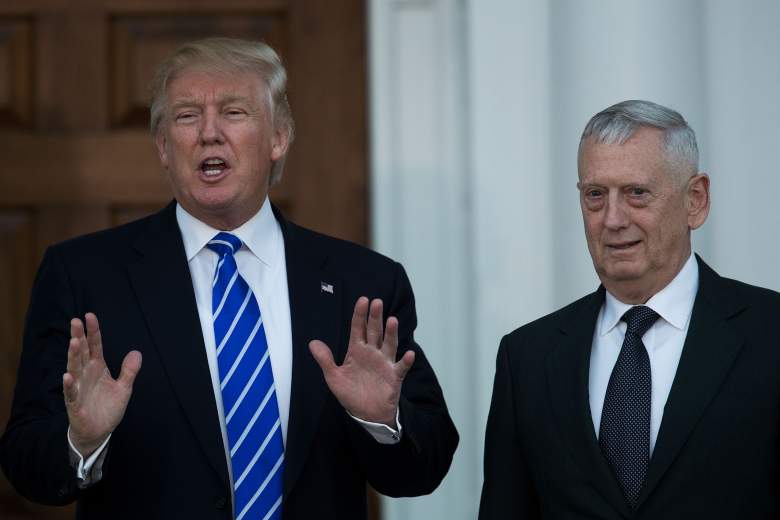
(Getty)
In 2010, Mattis replaced David Petraeus as commander of U.S. Central Command, overseeing all military activity in the Middle East. Obama nominated him for the position and he was confirmed by the Senate Armed Services Committee. This was the last position he held before retiring from the Marine Corps in May 2013.
Just two months after his retirement, Mattis appeared at the Aspen Security Forum. During an Q&A session with CNN’s Wolf Blitzer, he said his job at CenCom was made difficult because the U.S. is seen as “biased in support of Israel,” The Times of Israel reported.
“I paid a military security price every day as the commander of CentCom because the Americans were seen as biased in support of Israel, and that moderates all the moderate Arabs who want to be with us, because they can’t come out publicly in support of people who don’t show respect for the Arab Palestinians,” Mattis said.
At that same event, Mattis said that the current situation in Israel is “unsustainable.” He supports the two-state solution and thinks that the Israeli settlments could lead to apartheid.
“If I’m in Jerusalem and I put 500 Jewish settlers out here to the east and there’s 10,000 Arab settlers in here, if we draw the border to include them, either it ceases to be a Jewish state or you say the Arabs don’t get to vote — apartheid,” Mattis explained, Haaretz reports.
Due to these comments, the Zionist Organization of America said that Trump shouldn’t nominate Mattis.
2. Mattis Thinks the Iranian Regime is the ‘Single Most Enduring Threat to Stability & Peace in the Middle East’

(Getty)
Mattis has been critical of the Iran nuclear deal that the Obama Administration struck. During an April event at the Center for Strategic and International Studies, Mattis said that he thinks the Iranian regime is still the most dangerous threat in the Middle East.
“The Iranian regime, in my mind, is the single most enduring threat to stability and peace in the Middle East,” Mattis said, reports the Military Times. “For all the talk of ISIS and Al Qaida everywhere right now… they’re a very serious threat. But nothing is as serious in the long term enduring ramifications, in terms of stability and prosperity and some hope for a better future for the young people out there, than Iran.”
During that same speech, Mattis said that it looks to him like Washington has “forgotten how to keep certain issues forefront” and criticized Congress for being “pretty much absent” when the Iran deal was first stuck.
“We are going to have to recognize that we have an imperfect arms control agreement,” he said, adding that all the deal achieved was a “nuclear pause, not a nuclear halt.”
“We’re going to have to plan for the worst,” he said.
During testimony before the Senate Armed Services Committee in March 2013, Mattis said he believes that, if Iran gets a nuclear weapon, another country in the Middle East will try to get one as well.
“At least one other nation has told me they would do that,” Mattis said. “At a leadership level, they have assured [me] they would not stay without a nuclear weapon.”
Mattis wouldn’t say specifically which country’s officials told him that, but he gave an affirmative answer when Senator Lindsey Graham asked if it might be a “Sunni Arab State.”
3. Mattis Says There is a ‘Perception We’re Pulling Back’ on U.S. Commitments to Allies
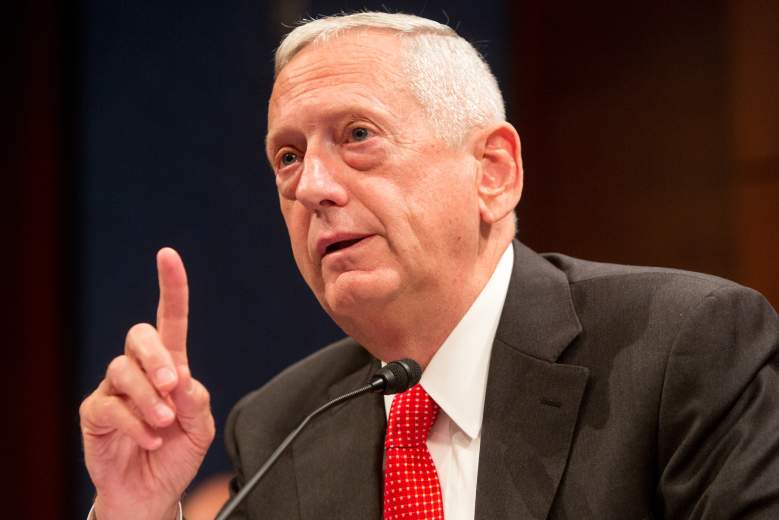
(Getty)
In 2015, Mattis spoke at the conservative Heritage Foundation, where he said that the U.S. doesn’t have a global strategy any longer.
As the U.S. Naval Institute notes, Mattis said that there is a “perception we’re pulling back” on commitments to America’s allies, leaving them to fend for themselves. “We have strategic atrophy,” he said.
Mattis suggested that China “is doing a pretty good job of finding friction points between our allies,” like Japan and South Korea.
He called on the U.S. “to find the people who want to stand with you,” like the United Arab Emirates and Jordan.
Mattis has stressed the importance of the U.S. keeping positive relationships with allies, once criticizing Obama for suggesting that some U.S. allies are “free riders” in a interview with The Atlantic.
“It wasn’t Trump; it was the president saying that our allies are free riders and that sort of thing,” Mattis said in April. “For a sitting U.S. president to see our allies as freeloaders is nuts.”
4. Mattis, Like Trump, Doesn’t Want ISIS to Know We’re Coming
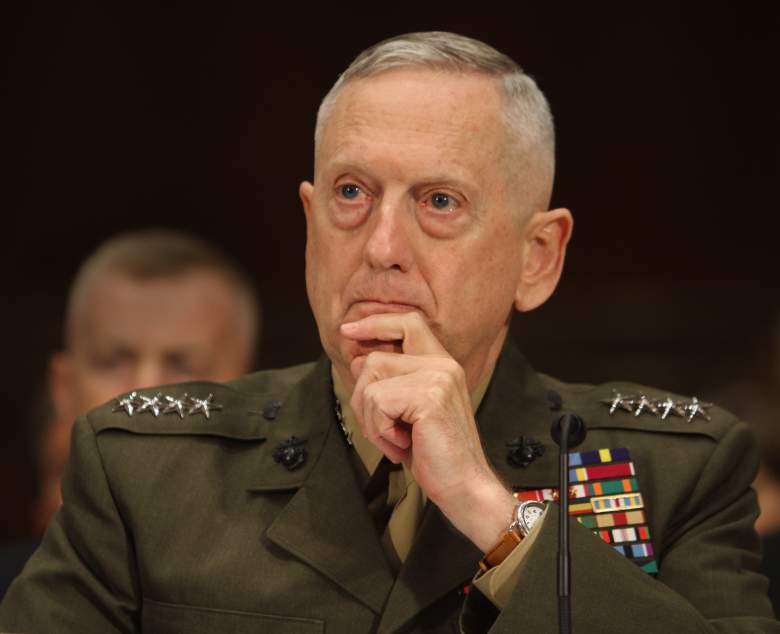
(Getty)
During the presidential campaign, Trump said that he has a plan to defeat ISIS, but refused to explain that that was. His rationale was that announcing your plans to the world to the enemy set our allies up for failure. In Mattis’ 2014 testimony before the House Intelligence Committee, also said that the enemy shouldn’t know how the U.S. will act before it does.
He explained:
Whichever strategy is chosen, we should be reticent in telling our adversaries in advance any timeline that governs us or which of our capabilities we will not employ. Specifically, if this threat to our nation is determined to be as significant as I believe it is, we may not wish to reassure our enemies in advance that they will not see American ‘boots on the ground’: if a brigade of our paratroopers or a battalion landing team of our Marines could strengthen our allies at a key juncture and create havoc/humiliation for our adversaries, then we should do what is necessary with our forces that exist for that very purpose. The U.S. military is not war weary, our military draws strength from confronting our enemies when clear policy objectives are set and we are fully resourced for the fight.
In an interview with Time Magazine in September, Mattis said that the current fight against ISIS is “unguided by a sustained policy or sound strategy [and is] replete with half-measures.”
5. Mattis Believes America Must Stand ‘Unapologetically’ for Freedoms U.S. Citizens Enjoy to Sustain the International State System
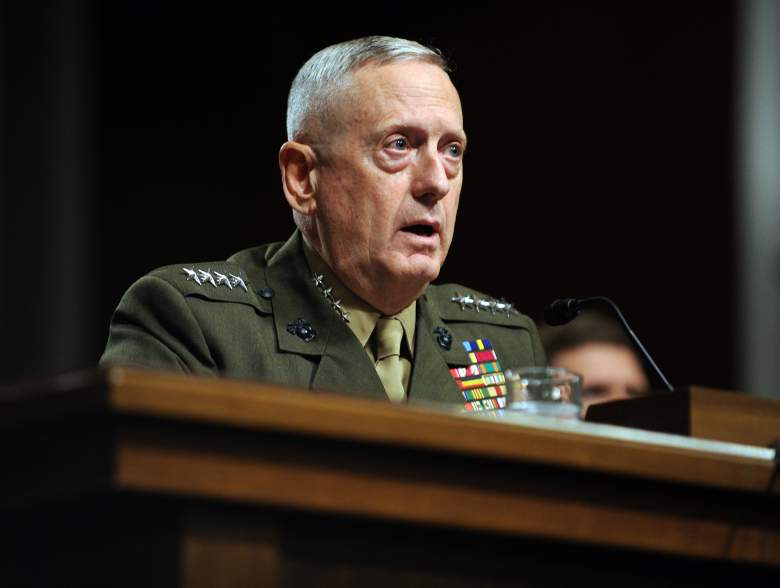
(Getty)
In his opening statement to the Senate Armed Services Committee during a hearing in January 2015, Mattis made the case for the U.S. taking an active role on the world stage.
“The international order built on the state system is not self‐sustaining,” he said. “It demands tending by an America that leads wisely, standing unapologetically for the freedoms each of us in this room have enjoyed.”
He went on to say that the U.S. government has “lived too long now in a strategy-free mode.” He insisted that the U.S. needs a new strategy and that our immediate reaction to events can’t be isolation.
“In some cases you may need to change our processes for developing an integrated national strategy, because mixing capable people and their good ideas with bad processes results in the bad processes defeating good peoples’ ideas nine times out of ten,” Mattis told the committee. “This is an urgent matter, because in an interconnected age when opportunistic adversaries can work in tandem to destroy stability and prosperity, our country needs to regain its strategic footing. We need to bring clarity to our efforts before we lose the confidence of the American people and the support of our potential allies.”
